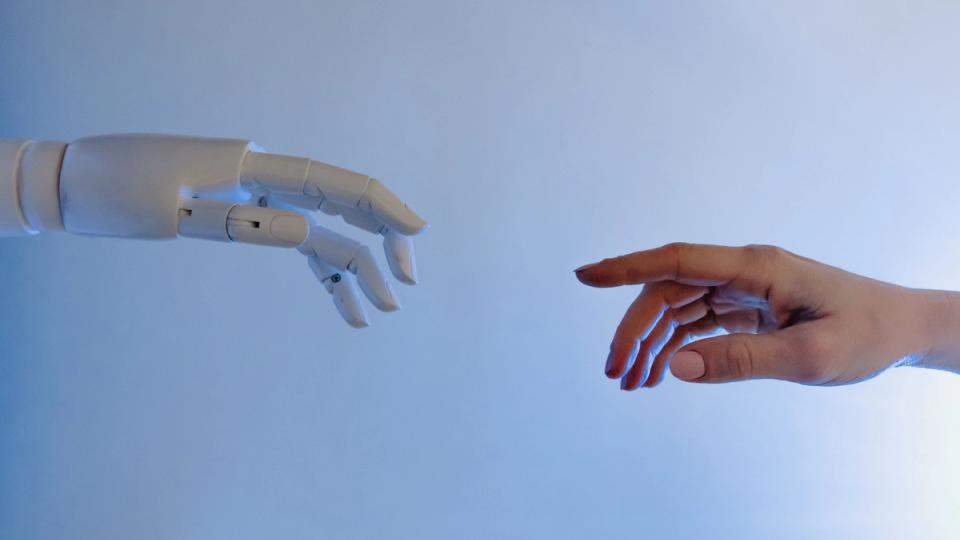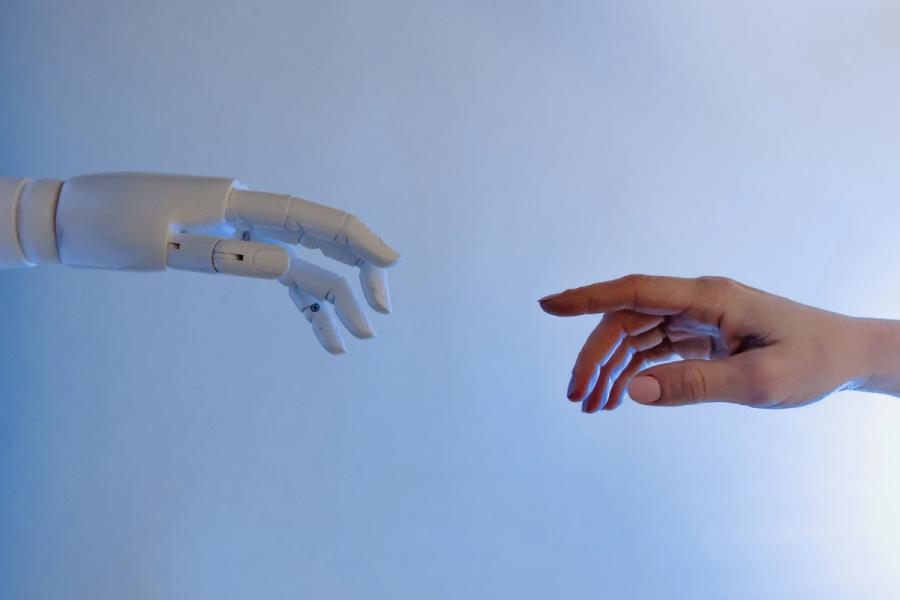Engineers vs artificial intelligence : the Great Replacement?
Will we still need engineers in 20 or 30 years’ time? This is the not-so-naïve question being asked by some scientists and observers of the labour market. In 2017, a very serious study by the Future of Humanity Institute in Oxford questioned over 350 experts on the subject. To summarise, 43% of jobs in Europe may be threatened by the progress of artificial intelligence.

Faced with the meteoric progress of data analysis and the use of increasingly powerful algorithms, how will the engineers of tomorrow position themselves and how will they manage interactions with ‘machines’?
Digital, digital everywhere
The ‘digitisation’ of our lifestyles has not spared the workplace, and even less so the professions linked to the design and manufacture of physical or digital objects.
Doctors, civil engineers and computer network architects all make intensive daily use of technology to improve their diagnoses, design structures faster and without calculation errors, or correctly resize a network infrastructure. In short, technology is everywhere; AI, robotics and digitisation in the broadest sense are already part of the scientific landscape.
Sometimes, within their companies, some engineers help develop and perfect these algorithms and other machine learning tools. Digitisation is one of the major areas of innovation and competitiveness.
It should be noted in passing that, even at government level, most Western countries are investing massively in technologies linked to artificial intelligence, attracted as they are by its promise and all the opportunities for growth it is supposed to deliver in the near future, and also because it is fashionable to do so.
Disappearances foretold
It is undeniable that, in certain activity sectors, a number of repetitive tasks or even jobs will simply disappear. This applies for instance to some customer services that valiant chatbots will take over, or the banking sector, which is increasingly operating without humans for routine transactions performed by individuals.
The OECD figures are less alarmist than those from Oxford: 9 to 12% of jobs could disappear due to (some might say ‘thanks to’) robotisation. These are mainly low-skilled or unskilled jobs, but recently the concern has spread to scientific occupations: what if AI becomes so powerful that even the jobs that require the most ‘pure grey matter’ are threatened?
The limitations of artificial intelligence
Although machines manage many aspects of our lives, they are structurally not in a position to ‘replace’ humans. In order for a computer to perform a special task, computer engineers can create a kind of ‘neural network’. However, such networks bear no relation to the human neural network in our brain. In AI, a neural network always involves the prior design of a computer program (an algorithm) that links one piece of information to another.
No cause for concern
The brain is unique: it has over 100 trillion neurons or electrically conductive cells that give the human brain its unique and incredible computation power. We need to remember that we don’t even know how the brain works!
Before we can imitate it, decades of neuroscience research will be required to get a vague idea of how it functions. In this sense, we can be reassured that artificial intelligence will not be outperforming human intelligence in the near future.
The disaster scenario of the scientist losing control of his ‘creature’, as in Mary Shelley’s Frankenstein, is therefore unlikely to happen in the short term.
Opportunities
For most engineers, artificial intelligence is a tool and an opportunity to restore the profession of engineer to its rightful place. With the globalisation of trade, businesspeople have taken precedence over scientists, who have often been downgraded to ‘geeks’ or ‘boffins’. However, the exploits of AI are precisely down to the well-stocked and well-intentioned minds in charge!
“Digital and artificial intelligence tools can help us, for instance, by allowing us to analyse big data much faster. This will really speed up decisions and ensure they are better informed. But the final decision will always be down to a human engineer. AI, robots and software are all tools created by engineers to be used, in particular, by engineers,” says bioscience engineer Claire Deligant.
The impact of AI on the engineering profession can be summarised by this statement from Robert Plana, Chief Technology Officer at Assystem: “The new tools that are available to us or currently under development turn engineers into designers, modellers and results analysts. And increase their capacity for informed decision-making. “
The real challenges of AI for engineers
While technological, digital and robotic innovations can reveal and enhance the abilities of the most brilliant engineers, they also place a heavy responsibility on their shoulders: that of the ultimate significance of their actions. Digitising, computerising, designing better and faster are all very well, but to what purpose? We need to take ownership of the tools of our time, but that is not enough.
The current economic, social and environmental challenges are causing all engineers to be faced with the issue of purpose. In the area of engineering, the challenge is to better describe the complexity of projects, to better understand hazards, to better anticipate failures, to build a more resilient and fairer world. Recently, oil giant Shell was ordered by a Dutch court to improve its climate-related goals. A good example of an ethical dilemma for engineers: how can they use technology to build a better world?
At the beginning of this century, by mastering AI, engineers have a unique opportunity to envision and shape a more positive industry that benefits the majority. Good luck to all of you!
Our latest articles

The Engineer of the Future – an identikit portrait
If the engineering profession offers women a bright future, what about the challenges that the engineers of the future will all be facing in 10, 20, 30 years’ time? What will the engineer of the future look like, male or female?

Engineers vs artificial intelligence : the Great Replacement?
Will we still need engineers in 20 or 30 years’ time? This is the not-so-naïve question being asked by some scientists and observers of the labour market. In 2017, a very serious study by the Future of Humanity Institute in Oxford questioned over 350 experts on the subject. To summarise, 43% of jobs in Europe may be threatened by the progress of artificial intelligence.

9 tips for a successful job interview
You’re looking for a job, you sent out loads of CVs… and you’ve been invited for an interview! Fantastic news! Congratulations!